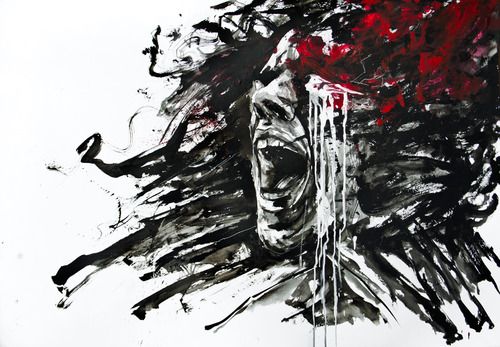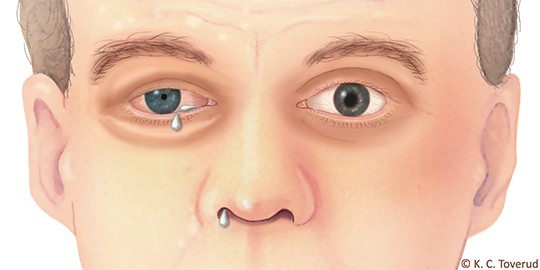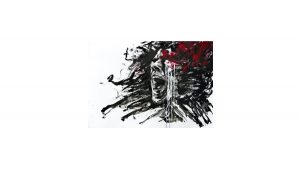
What are the typical characteristics of a cluster headache attack?
- Location of pain: eye, temple, forehead. The pain may also go to the cheek, jaw, teeth and neck.
- Type of pain: very severe, excruciating. Sometimes described as a poker crushing the eye. The pain may rise fast and stop abruptly.
- Other symptoms: on the same side of the pain, teary eye, runny nose, droopy eyelid, red ear, small pupil. Restlessness, agitation.
- Duration of attack: 15 minutes to 3 hours, sometimes may last more, or less if treated.
- Frequency of attacks: 1 every other day to 8 per day.
- Nausea and light sensitivity may occur.
Read more [1]

What is chronic cluster headache?
Most patients (90%) with cluster headache suffer from the episodic form, meaning that they have remissions (with no attacks) of more than 1 month and the cluster periods do not last more than 1 year. Most cluster bouts last 4-12 weeks.
10% of patients will go into chronic cluster, with almost no remissions. These people often report a constant baseline pain, shadow pains, milder attacks. Chronic cluster is very difficult to treat and extremely disabling.
Is cluster headache different from migraine?
Differences suggesting cluster:
- More men than women
- Pain is more focused on the eye and temple
- Pain more intense, excruciating
- Agitation and restlessness
- Attack lasts less than 3h without acute treatment
- Seasonal pattern with long remissions and clock-regular attacks
- Oral triptans [2] not very effective.
Similar points include:
- Alcohol and vasodilators can trigger
- Triptans (sprays, injections) control the attack
- Both conditions may present with a mild degree of autonomic «cluster» symptoms (teary eye, runny nose) and «migraine [3]» symptoms (nausea, light and sound sensitivity).
Some people have both types of attacks and can distinguish them clearly. For others, the attacks cannot be clearly classified as they have features of both cluster and migraine. These people sometimes are diagnosed as «cluster-migraine», not an official diagnosis in the international classification, but a descriptive term.
Are there triggers for cluster headache attacks?
Patients report typical triggers. Alcohol, sleep, neck posture seem associated. Drugs that dilate blood vessels like nitroglycerine and Viagra may trigger attacks. Not all patients report triggers.
I heard that cluster headache is called «suicide headache», is it true?
It is sadly common for patients with cluster to feel suicidal, especially during an attack. Even between attacks, cluster patients report more suicidal ideas and some will attempt suicide. It is very important to address those thoughts.
What is the cause of cluster headache?
Many particular symptoms and traits of cluster suggest a link with biological clocks located in the hypothalamus. The attack itself is an activation of the pain pathways of the face. The eye and nose symptoms probably come from the activation of a normal reflex linking pain networks and other nerves producing tearing, flushing, runny nose and change in the eye. At present time, we do not completely understand why cluster can be very episodic with long remissions, why a bout starts, and why some patients transform into the chronic form.
Is cluster headache genetic?
The evidence that cluster headache is mediated by genes is scarce. There are reports of families and twin pairs with cluster, but overall we do not have a strong evidence of genetic patterns. Difference genes have been studied, with no clear associated with cluster. At present time, most people with cluster headache should not be concerned that their children will have it too.
What are the usual treatments for cluster headache attacks?
The cluster headache attack starts very fast and treatments must act fast too.
Oral triptans are usually too slow, unless the timing of the attack can be predicted and the oral triptan taken in advance.
Injectable sumatriptan [4] and intra-nasal zolmitriptan are the two best options for most cluster patients. These drugs cannot be used with a history of heart disease or stroke.
Inhaled oxygen (100%, 10-15 liters/minute with a non-rebreathable mask) is a good and safe option. Some patients report that the efficacy is not as good, and that the oxygen just postpones the attack.
NSAIDs are usually not effective for cluster. Indomethacin is a particular NSAID that may be effective on headaches that are similar to cluster like paroxysmal hemicrania [5] and hemicrania continua [6].
Opioids may be used as a last resort but may lead to addiction and rebound. They should never be prescribed unless the patient is followed by an expert center.
What are the treatments to manage cluster headache episodes?
Patients have to be aware that research on cluster headache is difficult as it is not common, unpredictable, and so severe that patients may be reluctant to engage in placebo studies. Here are options to break a bout frequently used in practice:
- Verapamil (a calcium channel blocker)
- Occipital nerve blocks with steroids
- Oral prednisone
Other options with limited scientific evidence include topiramate [7], lithium, valproate, DHE IV (cannot use triptans at the same time), gabapentin.
There is a very long list of options tried on a few patients only.
What about CGRP antibodies for cluster headache?
Galcanezumab (Emgality) has been studied for cluster and is effective to decrease the number of attacks in episodic cluster headache. It will be the first drug approved for cluster headache prevention in Canada and the USA. This drug will come to market in Canada in 2019 for migraine and for cluster is expected in 2020. This drug is well tolerated and it is an auto-injector with one dose every month until the bout has ended. Responders to galcanezumab might find that this is a good way to control a bout, as verapamil has a lot of side effects [8], and nerve blocks are not easy to access.
I heard that psilocybin (magic mushrooms) can be used for cluster headache?
Psilocybin acts on the serotonin system. From a scientific perspective it might be effective for cluster, as it is similar to methysergide, a drug that was used in the past but is not available anymore (there were risks of fibrosis of the organs).
Because psilocybin is an illicit substance it cannot be studied legally. Patients registries suggest that small doses of psilocybin may break a bout.
More resources on cluster headache
Clusterbuster website: https://clusterbusters.org/ [9]
OUCHUK: https://ouchuk.org/ [10]
REFERENCES
Hoffmann J, May A. Diagnosis, pathophysiology, and management of cluster headache. Lancet Neurol. 2018;17(1):75-83.
Tepper SJ, Stillman MJ. Cluster headache: potential options for medically refractory patients (when all else fails). Headache. 2013;53(7):1183-90.
Becker WJ. Cluster headache: conventional pharmacological management. Headache. 2013;53(7):1191-6.
Post#402
